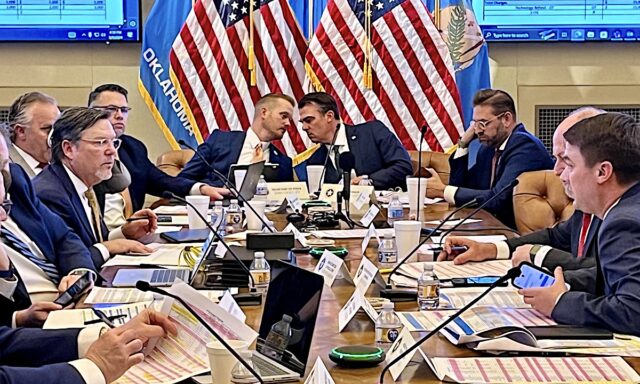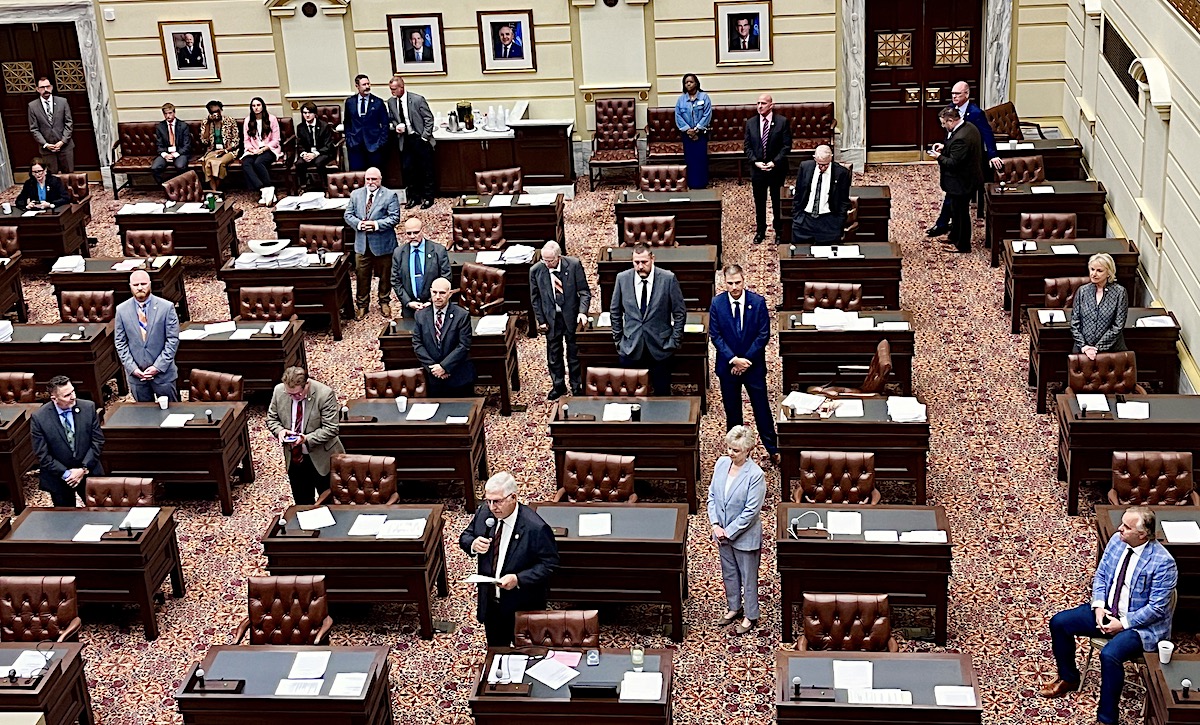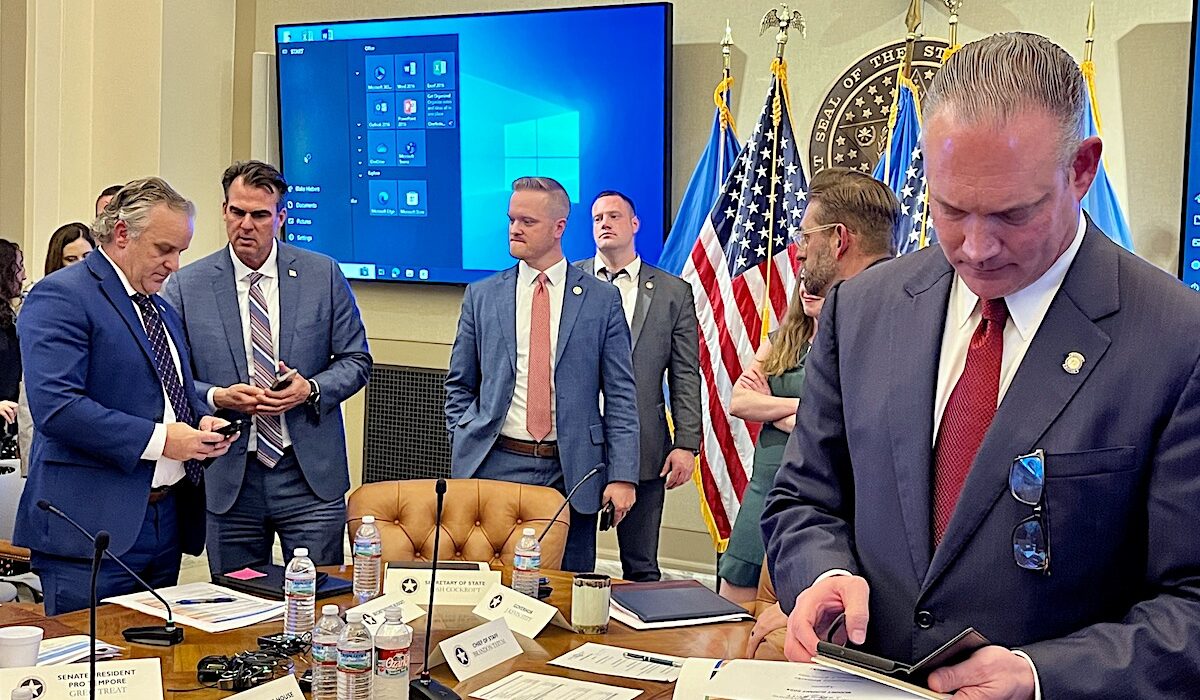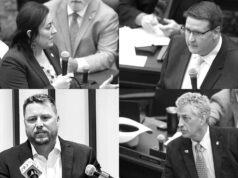
If at first you don’t succeed, try and try again.
Leaders of the Oklahoma Legislature and Gov. Kevin Stitt gathered today for the second time this week around 30 feet of conference table at the State Capitol in hopes of closing in on a budget agreement for Fiscal Year 2025.
While the discussion proved significantly more fruitful than Monday’s first bite at the apple, a handful of major decisions are still ripening on the vine.
“We have made tremendous progress, so I would encourage the two chairs to meet publicly, privately, however we want to do that,” Stitt said just before 5:30 p.m. when the assembled politicians called it a day after more than three hours of appropriation conversation.
At times, the public conversation again grew chippy, with House members griping that the Senate had not followed instructions about emailing over numbers and Senate President Pro Tempore Greg Treat (R-OKC) saying the House’s spreadsheet showing their desired income tax cut “doesn’t balance right now.”
That caused House Appropriations and Budget Chairman Kevin Wallace to lambast his counterparts for how a change in Senate appropriations chairmen suddenly justified the Senate unwinding negotiations to restart from its Senate Resolution 31 while the House’s online portal reflected weeks of negotiations.
RELATED
‘They lied to our team?’: Public budget talk gets chippy by Tres Savage
“Your SR 31 (…) let’s just say that’s starting ground zero. The House came out with our portal and our budget numbers, let’s just call that 10. So everybody knows where we started,” said Wallace (R-Wellston). “We negotiated. We went from — you guys went from zero to four. The House came from 10 to six. We had an agreement except for the gap in the middle. Now then, you come in and you back up, and you guys want to go back to zero. You want to use our number from a negotiated position and say, ‘OK, let’s start negotiation and let’s go here.’ So now you’re asking the House to negotiate from literally 10 to probably about 3, and you’ve retracted and — I mean, just be honest — reneged on negotiations. Your sub-chairs were in there.”
Treat acknowledged Wallace’s frustration, and the parties agreed to begin the day’s negotiations at the House position from April 16. But both sides fired off other criticisms before the day was through.
“Incompetence and dysfunction does not equal transparency,” Wallace said during a discussion of appropriations for House and Senate operations.
Faced with the harsh words on his birthday, Treat took issue with the characterization, but he also said his past accusation that Wallace pushes “pet projects” was equally unproductive.
“Me calling things ‘pet projects’ may have been disparaging to you [but] we say things in press conferences quickly,” Treat said. “But to say ‘incompetence and dysfunction’ is not an accurate description of what you have seen on the Senate side. What you have seen on the Senate is a complete commitment to transparency. We will not get everything perfect, nor will future legislatures, but this is our first foray into trying to go down that road, and I am proud of the members I serve with who have put in the work. So I take offense to that.”
Wallace said the House was focused on getting “our constitutional one and only duty done — a balanced budget by the last Friday in May.”
Treat found common ground.
“Yep, we will get there by May 31, I agree,” he said.
Working back from May 31, legislators have days to strike deal

While May 31 marks their ultimate deadline day for adjourning this year’s regular session, lawmakers face a much more compressed timeline owing to internal transparency goals, deadlines and a desire articulated by both Treat and House Speaker Charles McCall: “to trust but verify” that Stitt won’t veto something they consider important.
This year, that would mean sending Stitt all bills by Friday, May 24.
“The Legislature should always try to hit that date to give the governor appropriate time and let the Legislature wait and see (and) make sure the governor does what he says he is going to do,” McCall (R-Atoka) said after Thursday’s budget summit. “I believe Gov. Stitt will do what he says he will do. But we have learned historically that we should stick around for five days after just to trust but verify. So that would be the date that we should target as the last day.”
Treat, however, said he has not been calculating for the additional week to guarantee veto override opportunities.
“The only thing I would take out of the equation is that week to override gubernatorial vetoes that you would normally see us do,” Treat said before the budget summit. “With the House’s stance that they are not going to override gubernatorial vetoes — or at least that is my belief that they won’t override vetoes based on my conversations I have had with them over the last few months — that’s not as important.”
But McCall said Treat’s claim was false.
“We haven’t said that at all,” McCall responded. “What we’ve said is there is no need to consider any veto overrides nor (consider) all bills that are eligible for conference (committees) until we get a budget agreement.”
At their fastest, lawmakers could amend existing shell bills in their Joint Committee on Appropriations and Budget and deliver those measures to the governor’s desk in four days. Working backwards from May 24, that means first JCAB votes on the final appropriations package would need to occur Tuesday, May 21.
With the House initially committing to publish all JCAB bills at least 24 hours before they are heard and the Senate doubling that to 48 hours, those measures would need to be published online by Sunday, May 19.
Of course, legislation does not appear out of thin air. A dedicated team of behind-the-scenes fiscal staff in both the House and Senate must crank out the verbiage and line up the numbers.
“Staff has worked pretty good miracles for me in the past,” Treat said with a smile. “In all honesty, it will take about a day and a half once we get the agreement set to write it and put it through the whole process and all of that.”
But McCall suggested that crafting the measures will and should take a little longer once the House, Senate and governor come to an agreement.
“It’ll take nearly five days to draft the [general appropriations] bill once there is an agreement. I mean, it’s a voluminous document, and it takes so long because there has got to be multiple checks,” McCall said. “We have to pass a balanced budget. These bills have to be balanced.”
Working back from the May 24 self-imposed deadline, then, budget negotiators will likely seek to reach an agreement by Wednesday, May 15.
“You can’t use the 17th as the day to get the agreement, because we are both going to publish bills and make sure they are disclosed to the public with 24 hours or more before we start running them,” McCall said.
After second budget summit, what undecided issues remain?

If all of that feels like a tight timeline to meet for the Legislature to avoid the type of concurrent special session it controversially employed last year, that’s because it is. And with many legislators facing a June 18 primary election, being stuck at the Capitol in June is even less appealing than normal.
Between two unprecedented live-streamed budget summits and hours upon hours of Senate subcommittees this week, legislative leaders gave the public their full political monty, sorting through a variety of chamber-to-chamber disagreements over the year’s top funding questions, even if much of the discussion felt hard to follow for those not familiar with terms like “certified funds” or the rules for American Rescue Plan Act dollars.
Still, at least 10 major disagreements remained unsolved after more than three hours of Thursday’s second budget summit. With a third public budget summit proposed for an undetermined time Monday, the prominent policy decisions pending for Treat, McCall and their chief negotiators this weekend include:
- State Department of Education funding fix: One of the most contentious issues discussed at Monday’s budget summit received virtually no mention at Thursday’s: how to address a roughly $16 million hole in OSDE funding left in legal linguistic limbo by lawmakers last year when they pumped an historic amount of new funds into the agency for statewide teacher pay raises and other school initiatives. Often owing to the presence of oil pipelines, wind farms or major manufacturing plants, school districts considered “off” of the funding equalization formula receive no state aid. Both chambers of the Legislature agreed last year to fund at least the first year of mandatory teacher pay raises for those districts in an effort to avoid an unfunded mandate, but OSDE’s attorneys said bill language kept them from disbursing some of those funds to the off-formula districts. Now, as the Legislature prepares to address that hole at the end of Fiscal Year 2024, the Senate wants to provide those districts funding for the pay raise in perpetuity. The House, on the other hand, argues that off-formula districts already receive more money per pupil than their peers and that the Senate’s position would functionally break the formula and reward wealthier schools to the detriment of poorer districts.
- Stipends to support staff members at public schools: In the Senate, Education Chairman Adam Pugh (R-Edmond) has proposed a $100 million one-time appropriation to OSDE to provide $2,500 stipends for support staff personnel at public schools. The House, however, has argued that the massive investment in the state funding formula last year could have and should have boosted support staff pay. While the Senate might also accept a permanent recurring appropriation boost to OSDE’s funding formula budget instead, a more interesting comment has been made by Wallace of the House: Agree to an income tax cut in exchange for the additional education funding.
- Department of Public Safety training center: Another item that received no discussion Thursday provided one of the most controversial moments of the Senate’s vaunted subcommittee process Tuesday. Despite Treat saying that he had empowered subcommittees to make appropriation decisions, Sen. Brent Howard (R-Altus) said he’d been told by Senate leadership not to make a recommendation on “phase two” of the Department of Public Safety’s training center in Lincoln County that received an initial allocation last year. Senate Floor Leader Greg McCortney (R-Ada) described his strong feelings about the project’s historical baggage following Monday’s summit.
- Stipends to increase sheriff and deputy sheriff salaries: At the same time the House and Senate have disagreement over the DPS training center, they don’t agree on another public safety proposal. House leaders are in favor of creating a new $10 million stipend program to boost pay at county sheriff offices, which can pay below $30,000 annually in smaller counties. Creation of such a program would be a fundamental expansion of state government paying county government. In addition, senators have turned the House’s argument against education support staff stipends back upon them, and Thursday’s summit hearing featured an awkward discussion of which group of public employees is more prone to end up on food stamps, sheriff deputies or school workers.
- Judicial pay raises and evaluation: In September, the Board on Judicial Compensation held its biennial meeting and recommended a 17 percent raise for all appellate and district court judges in Oklahoma. Under state law, that recommendation presents the Legislature with three options: take no action and have the full recommendation take effect; pass legislation to raise judicial pay by a different amount; pass legislation rejecting the recommended raise entirely. Currently, the Senate is carrying a judicial pay raise roughly half of the recommended amount, but Wallace is still attempting to leverage the issue into approval of his long-desired judicial evaluation program.
- Water system upgrades: One of the Senate’s largest new funding priorities this session has been $125 million to the Oklahoma Water Resources Board for additional local water system grants. But as has been reported before — read until the end — Wallace has concerns about how the Department of Environmental Quality is losing money on engineering, inspections and permitting for a slate of local water projects already funded at OWRB last year by the Legislature.
- Progressing Rural Economic Prosperity (PREP) funds: In 2022, the Legislature buttressed its financial incentive package seeking a Panasonic battery plant with the designation of $250 million for a new grant program called PREP. Intended to make more economic development sites “shovel ready” all around the state, some of the PREP projects designated for funding have languished, leading some senators to fear further designation of such dollars. The House, however, has proposed another $250 million for PREP 2.0.
- How much to use the Legacy Capital Financing (LCF) Fund: Don’t know what the Legacy Capital Financing Fund is? You’re not alone at the State Capitol. Created in 2023 as a way to self-finance capital projects and provide an additional fiscal failsafe by delaying payments during future bad revenue years, the LCF received $600 million, about $350 million of which was immediately designated for state improvement projects. This year, some senators have derided the LCF as a “buy-now, pay-later scheme,” although Treat praised it Thursday. With dozens of capital projects up for financing this session, how much cash is designated to agencies with required LCF paybacks will bear watching.
- Legislative Services Bureau / House / Senate funding: As mentioned above, conversations about how much money the Legislature should give itself grew tense and personal Thursday. House members have said an additional $4 million for their chamber would achieve “per-member parity,” but Treat called that a “bogus calculation” and said the House has access to $40 million in the Legislative Services Bureau for additional needs. Both chambers agreed to keep their budgets in line last year, and it’s possible the disagreement will once again not be resolved this year.
- Deferred maintenance money: Perhaps one of the easier disagreements to resolve, the Senate has been carrying a $500 million figure for addressing deferred maintenance projects at universities, state parks and state agencies. Meanwhile, the House has proposed $335 million.
- Tax policy: Perhaps the biggest shadow hanging over budget negotiations involves Oklahoma’s personal income tax rate, which lawmakers cut 0.25 percent in 2021. Rumored as a 2026 gubernatorial aspirant, McCall badly wants another 0.25 percent reduction of the personal income tax rate. Stitt does as well, although he pivoted some Thursday and prioritized a proposal to flatten income brackets and raise the standard deduction, which he claimed would help lower earners. Treat, however, has emphasized repeatedly that the Senate’s final decision on tax reform this year came in February when the state portion of sales tax on groceries was repealed.
“Don’t sell yourself short, you just gave Oklahomans the largest tax cut in state history,” Treat told a House counterpart during Thursday’s summit.
Before the concluded talks Thursday, lawmakers did agree to call the year’s first JCAB meeting for sometime Monday morning. The only bill pledged to be on the agenda is one proposing $45 million for the Office of Emergency Management, which would help local communities with funding to reach a match required by the Federal Emergency Management Agency for disaster response.
In recent weeks, the state has seen significant tornado damage in the communities of Sulphur, Holdenville, Barnsdall and surrounding areas.
Watch the full budget summit from May 9






















